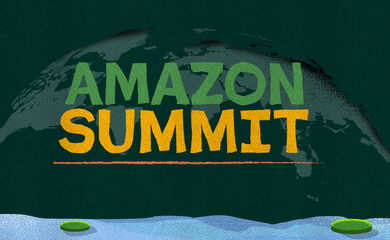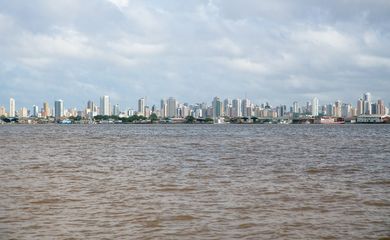Climate debate: Influencers go on immersion trips in the Amazon

To delve into the traditions and customs of an indigenous community deep in the Amazon forest, taking part in dialogues and initiatives in defense of the environment—such is the experience proposed by the Creators Academy, a project by the Oyá Institute, an NGO led by climate change activist and social entrepreneur Kamila Camilo.

At the end of July, the project took a group of 70 communicators—mostly digital influencers with thousands of followers on social media—for a five-day immersion trip in the Puyanawa indigenous territory, in western Acre state, some 700 km from capital Rio Branco. Last year, another group had gone on a similar mission in a riverside community in the neighboring state of Amazonas, also in North Brazil.
“The idea is to benefit from the power of those who communicate and influence others in order to raise awareness about the effects of climate change,” Camilo said. “I believe the biggest challenge regarding the climate agenda both in the news and online is the fact that the faces of the people of the Amazon don’t come up. All they show is numbers, statistics. By displaying their faces—and bringing people from such different worlds to live together—we make our message a lot more powerful,” she added.
During the trip, participants interacted with the indigenous people producing cassava flour, swimming in a local stream, bathing in medicinal herbs prepared by the village chief, having their bodies painted with jenipapo and urucum, and joining ritualistic dances, in addition to developing mutual bonds of affection with the hosts.
World views
Boasting over 146 thousand followers online, content creator Mister Prav, who hails from Benin, on the west coast of Africa, was in the group that flew to Acre and said he was moved by the experience.
In addition to his work in fashion and lifestyle, Prav uses his accounts to share his story as an African immigrant in Brazil and talk about African culture—something Brazilians still know little about, despite the deep historical ties between the two sides of the Atlantic.
“I came here to live with the Puyanawa people and to understand them. These climate changes are not affecting just Brazil, but the whole world. I’ve come to realize the position I’m talking from,” he noted.
Thuane Nascimento, executive director of Perifa Connection—a platform that mobilizes young people from marginalized urban areas across Brazil—described the immersion in indigenous territories as more than an extraordinary experience: a call to action in defense of the forest and its people, who are also living on the fringes of a capitalist world.
“A vital thing Creators Academy underscores is that it’s not about the experience or the immersion for their sake alone. Rather, it’s about leaving with the commitment to the fight for climate justice, taking a stance against environmental racism, in defense of these peripheral spaces. Because they’re not part of the socio-cultural, political, and economic center of Brazil,” she argued.
Indigenous artist Kaê Guajajara was also invited to the program and warned about the need to be willing to listen, which goes beyond the immersive experience itself. “We can’t just show up somewhere with a pre-conceived idea in our minds. We have to understand the place and think about how we can take action together,” she said.
“I believe we can have a better comprehension of what the well-being of the Earth really is. As indigenous people, we’re thinking about communities, about agriculture for the community—and not about commodification. We shouldn’t think of nature as a product, but as culture. It’s not just about visiting them and saying we’ve met them, but learning how to bring that into our lives and think about what we can do to move closer to this well-being and equity,” she added.
Digital influencer Ivan Baron, a disabled content creator with almost half a million followers, also partook in the immersion program. He was one of the personalities who walked up the ramp alongside President Lula during his inauguration on January 1, joined by world-famous indigenous leader Chief Raoni. In his view, adopting an intersectional view of the demands of the indigenous people, environmental justice, and people with disabilities is crucial.
“It was my first time in an indigenous village. As a person with a disability, I faced some challenges, like the lack of accessibility. I really believe we should underscore an intersectional approach. We’re all in the process of evolving. I grew as a person, and I had the chance to approach the climate justice agenda and the indigenous people, and I plan to pore over these topics as part of my work,” he said.
Change through communication
Kamila Camilo’s first forays into the Amazon date back to 2017, when she participated in the Barco Hacker project, at the invitation of another social entrepreneur, Kamila Brito, who took audiovisual technology activists to Amazon islands in Pará state. From then on, her relationship with the biome remained unbroken. More opportunities to do volunteer work in the region appeared as a result, and she even participated in some editions of the UN Conference on Climate Change (COP) abroad. That was when she realized that this debate was far from being part of the everyday lives of young Brazilians.
“During one of these COPs, in Glasgow, Scotland, I was talking to [communicator and activist] Raull Santiago and we realized that everything was really technical, that this conversation about climate change could never reach the Complexo do Alemão [favela] and other fringe areas of Brazil in this way,” she noted.
“I left these UN events thinking, ‘How am I going to get society to come together for the Amazon? It’s not a sexy subject.’ Looking at these impact models, I didn’t see any communication intervention on the climate agenda that could accelerate society’s participation, because everything was technical, and really difficult to explain,” Camilo argued.
While examining the modes of mass information consumption today, the activist noticed a gap. Brazil currently ranks third in the world in social media consumption. According to a survey by Nielsen Media Research, about 500 thousand people in the country are influencers, with at least 10 thousand followers each.
Consultancy Cadastra has noted that the increased use of social networks has led users to seek information and recommendations for products and services through people they admire and trust. In this connection, 60 percent of people prefer creators who speak to them and to whom they can relate when making a consumer or behavioral decision. Also, more than a third of these users feel encouraged by the opinion of a trusted influencer.
“The only intervention I’ve ever seen that’s managed to speed up change in society’s behavior is advertising, communication. If young people are shopping because influencers are leading the way, if they’re not reading, because they don’t have the patience to read, and they need quick information that’s also accurate, can I send things to these people? I have to talk to the people they listen to if I’m ever to reach them. That's why we had the idea of bringing people here who speak our language but are not yet engaged in our cause for climate justice,” Camilo said.
*The reporter traveled at the invitation of Creators Academy.





